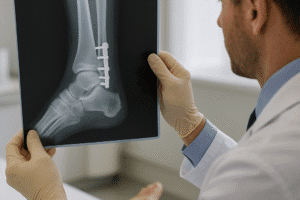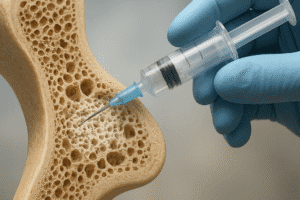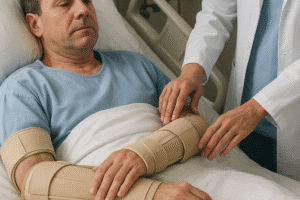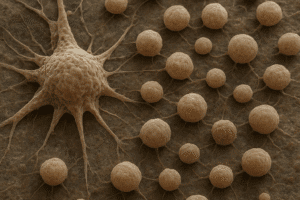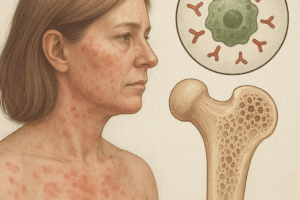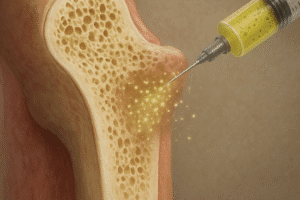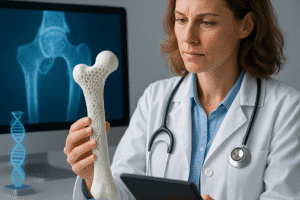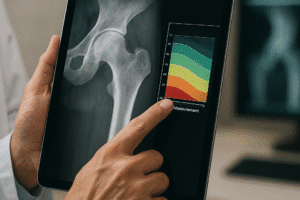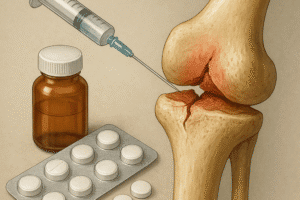Aging is a natural process that brings about various changes in the human body, one of which is the gradual decline in bone density. This phenomenon is particularly significant as it can lead to a range of health issues, including osteoporosis and increased susceptibility to fractures. Understanding how aging affects bone density is crucial for developing effective strategies to maintain bone health throughout life. This article will explore the biological mechanisms behind bone density loss, the risk factors associated with aging, and practical approaches to mitigate these effects.
The Biological Mechanisms of Bone Density Loss
Bone density is a measure of the amount of mineral matter per square centimeter of bones. It is a critical factor in determining bone strength and overall skeletal health. As individuals age, several biological processes contribute to the decline in bone density.
Bone Remodeling Process
The human skeleton undergoes a continuous process of remodeling, which involves the resorption of old bone and the formation of new bone. This process is regulated by a balance between two types of cells: osteoclasts, which break down bone tissue, and osteoblasts, which build new bone. In youth, the activity of osteoblasts typically exceeds that of osteoclasts, leading to an increase in bone density. However, as people age, this balance shifts.
- Increased Osteoclast Activity: Research indicates that the activity of osteoclasts tends to increase with age, leading to greater bone resorption.
- Decreased Osteoblast Function: Simultaneously, the function of osteoblasts diminishes, resulting in reduced bone formation.
This imbalance contributes to a net loss of bone density, making bones more fragile and susceptible to fractures.
Hormonal Changes
Hormonal changes play a significant role in the aging process and its impact on bone density. Key hormones involved in bone health include estrogen, testosterone, and parathyroid hormone.
- Estrogen: In women, estrogen levels decline significantly during menopause, leading to an accelerated loss of bone density. Estrogen is crucial for maintaining bone density as it helps to inhibit osteoclast activity.
- Testosterone: In men, testosterone levels gradually decrease with age, which can also contribute to bone density loss, although the effects are typically less pronounced than in women.
- Parathyroid Hormone: This hormone regulates calcium levels in the blood and can increase bone resorption when calcium levels are low, further contributing to bone density loss.
These hormonal changes highlight the importance of understanding the role of sex hormones in bone health and the need for targeted interventions as individuals age.
Risk Factors Associated with Aging and Bone Density
While aging itself is a significant risk factor for decreased bone density, several other factors can exacerbate this decline. Identifying these risk factors is essential for developing preventive strategies.
Genetic Factors
Genetics plays a crucial role in determining an individual’s peak bone mass and the rate of bone loss with age. Family history of osteoporosis or fractures can indicate a higher risk for bone density loss. Genetic variations can influence the activity of bone cells and the body’s ability to absorb calcium, further impacting bone health.
Nutrition and Lifestyle Choices
Diet and lifestyle choices significantly affect bone density. Key nutritional factors include:
- Calcium Intake: Adequate calcium is essential for maintaining bone density. As individuals age, their ability to absorb calcium may decrease, making it crucial to consume sufficient amounts through diet or supplements.
- Vitamin D: Vitamin D is vital for calcium absorption. Aging skin is less efficient at synthesizing vitamin D from sunlight, leading to potential deficiencies.
- Protein: Protein is necessary for bone health, and inadequate protein intake can negatively affect bone density.
In addition to nutrition, lifestyle factors such as physical activity, smoking, and alcohol consumption also play a role in bone health. Regular weight-bearing exercises can help maintain bone density, while smoking and excessive alcohol intake are associated with increased bone loss.
Medical Conditions and Medications
Certain medical conditions and medications can also contribute to bone density loss. Conditions such as rheumatoid arthritis, hyperthyroidism, and chronic kidney disease can negatively impact bone health. Additionally, long-term use of corticosteroids and some anticonvulsants can lead to decreased bone density.
Strategies to Mitigate Bone Density Loss
While aging is an inevitable process, there are several strategies individuals can adopt to help mitigate the effects of aging on bone density. These strategies encompass lifestyle modifications, dietary changes, and medical interventions.
Dietary Recommendations
To support bone health, individuals should focus on a balanced diet rich in essential nutrients:
- Calcium-Rich Foods: Incorporate dairy products, leafy greens, and fortified foods into the diet to ensure adequate calcium intake.
- Vitamin D Sources: Include fatty fish, egg yolks, and fortified foods, and consider safe sun exposure to boost vitamin D levels.
- Protein Sources: Ensure sufficient protein intake through lean meats, legumes, and dairy products to support bone health.
Physical Activity
Engaging in regular physical activity is one of the most effective ways to maintain bone density. Weight-bearing exercises, such as walking, jogging, and resistance training, can stimulate bone formation and slow down bone loss. Balance and flexibility exercises, such as yoga or tai chi, can also help prevent falls and fractures.
Medical Interventions
For individuals at high risk of osteoporosis or significant bone density loss, medical interventions may be necessary. Healthcare providers may recommend:
- Bone Density Testing: Regular bone density tests can help monitor bone health and assess the need for treatment.
- Medications: Bisphosphonates, hormone replacement therapy, and other medications may be prescribed to help maintain or increase bone density.
- Supplements: Calcium and vitamin D supplements can be beneficial for those who struggle to meet their nutritional needs through diet alone.
Conclusion
Aging significantly affects bone density through various biological mechanisms, including hormonal changes and the remodeling process. Understanding the risk factors associated with aging can help individuals take proactive steps to maintain their bone health. By adopting a balanced diet, engaging in regular physical activity, and considering medical interventions when necessary, individuals can mitigate the effects of aging on bone density and reduce the risk of osteoporosis and fractures. As we age, prioritizing bone health becomes increasingly important for maintaining overall well-being and quality of life.
